ITD’s former HQ campus in Boise was to get new housing. Then the Legislature stepped in
- Oops!Something went wrong.Please try again later.
- Oops!Something went wrong.Please try again later.
One of Boise’s biggest redevelopment projects is on shaky foundations after legislators advanced a bill to block the nearly $52 million sale of the Idaho Transportation Department’s 44-acre campus on State Street.
The property at 3311 W. State St. near Lowell Elementary School and Veterans Memorial Park has been mostly vacant since a 2022 flood damaged the building, forcing the Idaho Transportation Department, or ITD, to move to the former Hewlett-Packard campus at 11311 W. Chinden Blvd.
With its location near downtown and sitting along the commuter-heavy State Street corridor, developers saw the mostly vacant campus as one of the hottest real estate opportunities in the city. In September, the Department of Administration selected a trio of developers to level the property and build a space for businesses and housing.
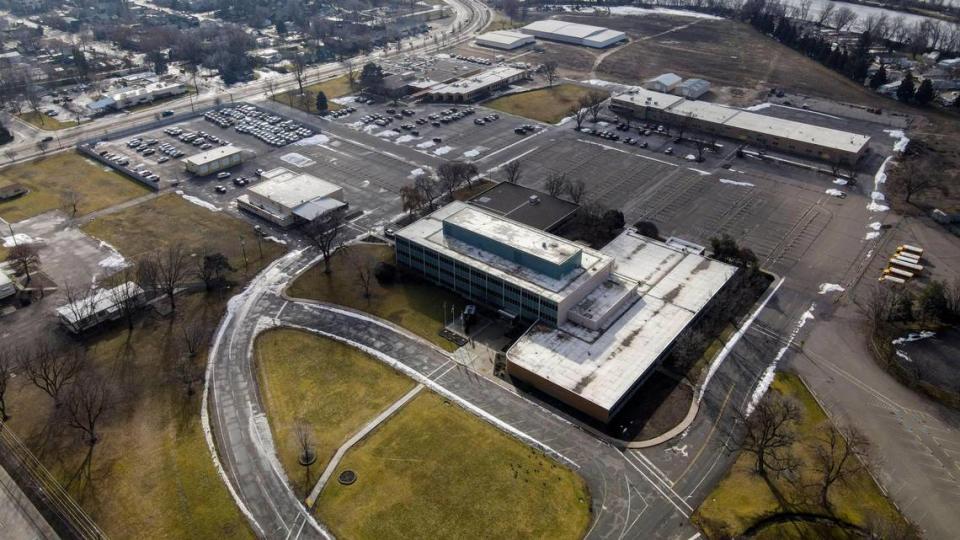
But some Idaho legislators, led by House Speaker Mike Moyle, R-Star, have taken a stand against redevelopment of the site.
Moyle said the sale would deprive Idaho of property it might need and feed any new tax revenue to the city’s urban renewal agency, the Capital City Development Corp. or CCDC, not to other taxing jurisdictions that could use the money. Because the property lies within Boise’s newest urban renewal district, the agency would keep any increase in property tax revenue through 2042, when the district expires.
“I hope they don’t sell it,” Moyle said. “Once you get rid of it, you can’t get it back.”
Moyle scored a big victory against the urban renewal agency and the trio of developers poised to revamp the site on Jan. 23, when a bill he sponsored blocking the sale passed 70-0 in the Idaho House. State officials are unsure what may happen if the bill passes the Senate.
The trio of developers include Idaho-based Hawkins Cos. and The Pacific Cos. along with Utah-based FJ Management. The latter operates convenience stores, hotels, oil refineries and senior communities.
“It’s a pretty unique property,” said Brian Huffaker, CEO of Hawkins Cos., in September. “I think most developers have had their eyes on this waiting for it to come to auction at some stage.”
A letter submitted by the developers outlined plans for over 2,000 units of new housing and “(the) creation of a new neighborhood that will provide convenient, walkable and needed services and shopping opportunities to an otherwise under-served area of Boise.”
The trio’s preliminary plans for the “prime piece” of real estate showed 17 acres of market-rate apartments on the inside of the property, five acres of affordable housing on the southeastern side, and houses and town houses along the western side, according to prior Idaho Statesman reporting.
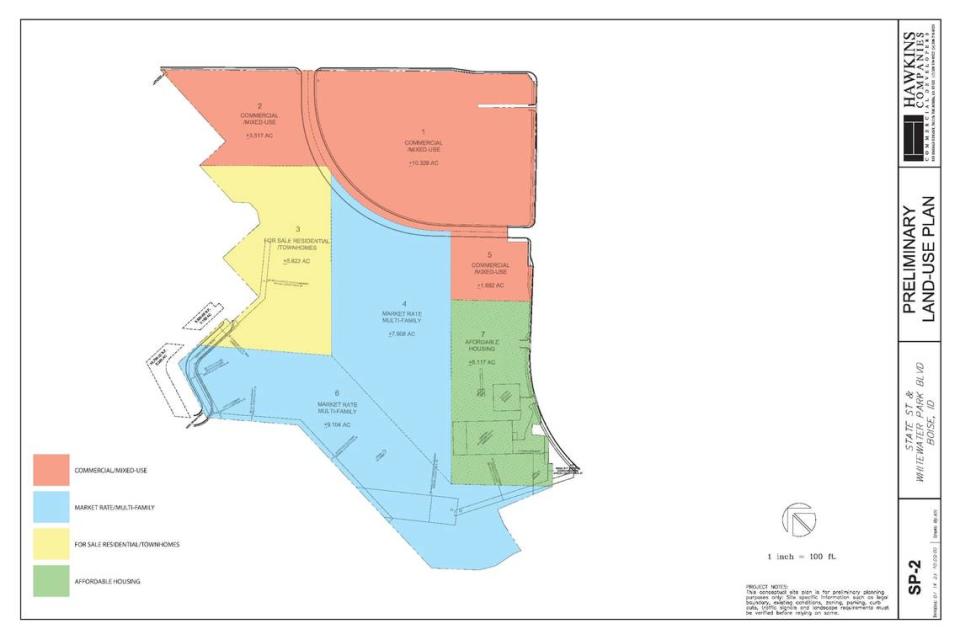
The project could boost economic activity along State Street, according to prior Statesman reporting.
But the sale — and the dreams of what the land could become — had yet to be finalized when the bill sponsored by House Speaker Mike Moyle, R-Star, and Rep. Britt Raybould, R-Rexburg, passed the Idaho House.
Statewide legislation targets single Boise property sale
HB 409 would repeal a section of Idaho code outlining the process for selling surplus state administrative offices.
The bill specifically takes aim at “state administrative facilities” and a different selling process they go through than other types of state property do.
Under the normal process, according to Raybould, the State Board of Land Commissioners has the authority to make decisions about what to do with surplus property, and it controls the selling process. The Land Board must notify other state agencies of the property’s availability and before there’s a chance for public auction four weeks later.
The Land Board is made up of Gov. Brad Little, State Controller Brandon Woolf, Secretary of State Phil McGrane, Attorney General Raúl Labrador and Superintendent of Public Instruction Debbie Critchfield. The board’s primary purpose is to manage lands for the benefit of public schools.
But for state administrative facilities, control is handed to the State Board of Examiners. That board’s duty is to examine claims against the state. It is made up of nearly same members as the Land Board except the state controller acts as the board’s secretary rather than a member, and the board does not include the state schools superintendent.
The Board of Examiners then hands the property off to the Department of Administration, which will notify all other state agencies that the property is available. If no other state agencies decide to take over the property, the Department of Administration can sell it.
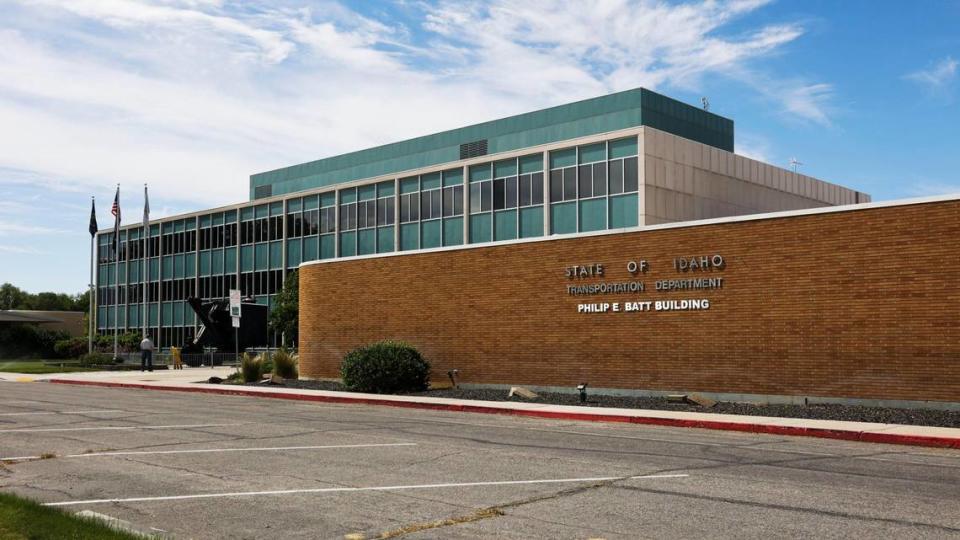
“Under the standard process, you’re looking at a minimum of four weeks, because of the notification requirements, and so it does take a little bit longer,” Raybould said during the House hearing on HB 409. “But it is my belief ... that it is to the benefit of the state to make sure that we provide a thorough amount of time to assess whether or not we dispose of state property.”
Raybould said her aim is to remove the administrative-facilities process from Idaho code and give state agencies enough time to discuss state property sales.
“Sometimes it is not in the best interest of the state and the constituents that we represent to dispose of it, and other times it is,” Raybould said. “What I’m advocating for with this repeal is a return to a more standard process for the disposal of all real property the state holds, including state administrative facilities.”
Urban renewal takes center stage in legislation
Moyle told the Idaho Statesman that the bill is a response to the sale of the ITD campus and originated from calls he received from constituents concerned about it.
Much of his own concerns, Moyle said in an interview, have to do with transparency and the city’s urban renewal agency, the Capital City Development Corp., or CCDC.
The bill, Moyle said, makes it so these types of sales aren’t done in a back room. He alleged that ITD received $6 million from insurance after the flood damage and questioned where that money went.
“There’s a whole lot of things that are fishy,” Moyle said. “We’re talking about transparency.”
HB 409 includes more elected officials into the process of selling state properties, Moyle said. However, the only elected official that would be added to this process is the state schools superintendent.
He alleged that the urban renewal agency “screws other people” and steals money from agencies like the highway, cemetery and mosquito districts.
The urban renewal agency does not take existing tax revenue away from other agencies and government services. But it skims all new revenue from rising property values and new development and uses that money to help fund more projects. Tax revenue to school districts, the city, the county, the Ada County Highway District and other taxing districts remains flat for the 20-year life of the urban renewal district.
“Tax increment financing .... is a tool used in 49 states that pays for public improvements by capturing the increase in property tax value resulting from those improvements,” according to CCDC.
The redevelopment of the ITD campus has played a significant part in CCDC’s plans for its district along State Street and the city of Boise’s attempts to revitalize and build up the busy commuter byway.
The ITD site is the largest parcel in the urban renewal district, but as a government property, the site doesn’t pay any taxes. Once it’s sold to private developers, the owners will start paying taxes on the land and whatever buildings are on it.
“The ITD-owned parcel is underdeveloped and is not being used to its highest and best use,” according to CCDC’s project plans for the district. “A goal of this plan is to support development opportunities of this site that will ultimately contribute significantly to the tax base.”
The urban renewal agency declined to comment on the bill and how it would affect their plans. A call to Tim Keane, the city’s planning director, went unanswered.
After the bill passed the House, it was referred to the Senate State Affairs Committee, where it is waiting to be scheduled for a hearing by Chair Jim Guthrie, R-McCammon. Guthrie said he would not schedule the bill until those involved make changes to it.
“We’re still working with the players to amend (it),” Guthrie said. “We’re just trying to mitigate some of the concerns.”
Some of those concerns and points of discussion for amendments, he said, surround the future of ITD campus.
Preserving the campus for history and other state uses
Moyle’s concerns went beyond the urban renewal agency. He said that despite the flood damage, the ITD building was still structurally sound and could be used by other state agencies if they repaired it — even if ITD doesn’t have plans to return to the campus.
“It doesn’t have to be ITD,” Moyle said.
Moyle said he didn’t know if other agencies were interested in using the site but that the Legislative Services Office was not informed of the sale. He said he wasn’t aware of other sites that could be affected by the bill, but that all state sales could benefit from going through the same process.
John Tomlinson, spokesperson for ITD, and Kim Rau, spokesperson for the Department of Administration, said they were also unaware of any other properties aside from the ITD campus that the bill could affect.
Moyle said he was concerned about the historic elements of the building, namely that it was named after former governor Phil Batt, that the Idaho State Historical Society still used a part of it, and that the state could lose the historic steam shovel on the property.
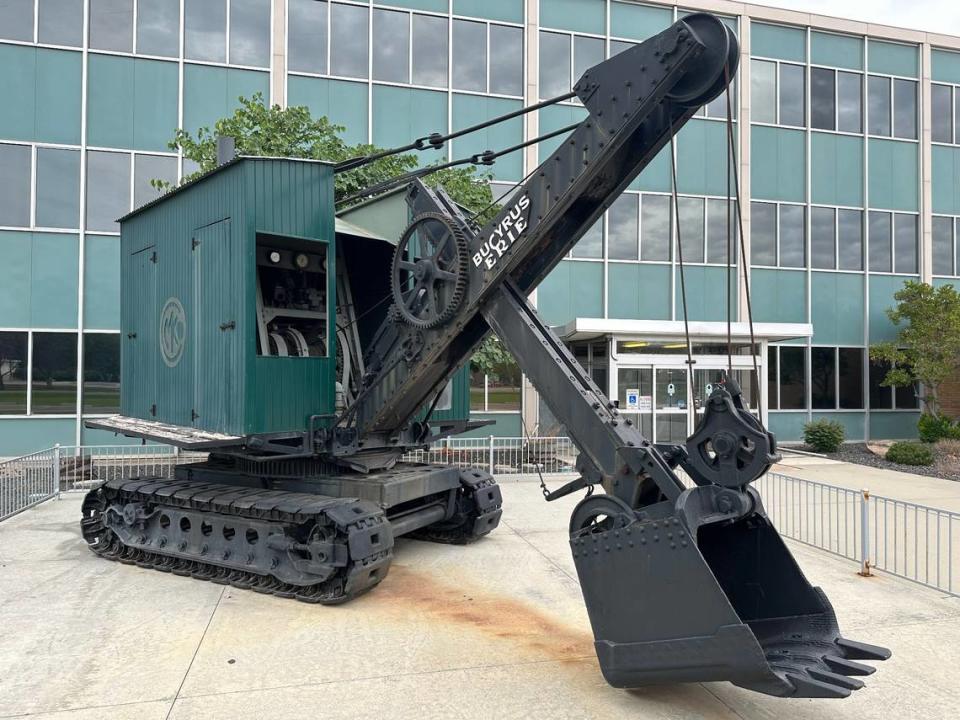
Moyle questioned why the state should sell the 44-acre campus when the state is renting spaces downtown. He said state leaders have regretted getting rid of state properties in the past and thought they could find uses for it as the state’s population continues to grow.
“Public hearing is the key to the whole damn thing,” Moyle said. “Maybe people ought to have more of a say.”
Raybould and Huffaker, the CEO of Hawkins Cos., did not respond to multiple requests for comment on the bill.
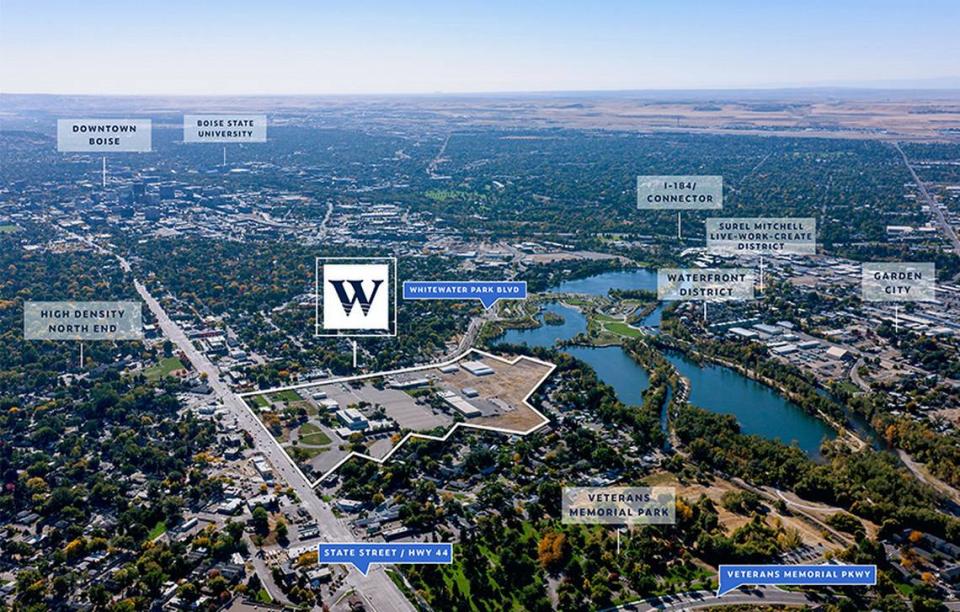
ITD’s campus plans move forward
Meanwhile, the Transportation Department is forging ahead with making the Chinden Campus its home.
“We are in the process of remodeling one of the buildings up here for our permanent location,” Tomlinson said by phone. “We’re just moving forward with what our plans are.”
About 20% of ITD staff still worked at the State Street campus in October and were set to relocate to the Chinden Campus when renovations there were finished, according to prior Idaho Statesman reporting.
Tomlinson said he did not know if ITD would ever consider going back to the State Street campus.
Plans for the Chinden campus submitted to the city of Boise show a new “ITD Annex” that would replace the State Street location and “provide services for the next 50 years.”
The plans call for two main buildings for ITD’s business and support management, a central laboratory and a secure area for a fleet of vehicles. Plans include an enclosed garage and covered parking structures.
“(The first building) is to be a secure flagship building located prominently on a busy street corner at the State of Idaho Chinden Campus,” according to the project description.
The second building would offer office space for ITD’s pavement-asset management, maintenance operations and traffic operations teams, according to the description. It would also provide minor maintenance and storage for fleet vehicles.
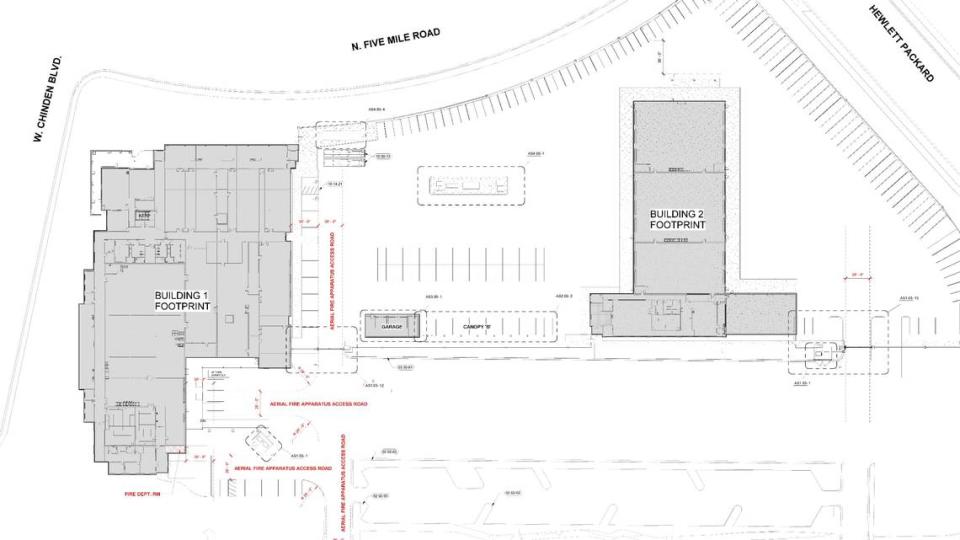
Documents disclose what developers envision for ‘prime’ ITD site on Boise’s State Street
Idaho sells old highway department HQ, ‘prime’ Boise real estate. This is who bought it
Save this historic building, a Boisean pleads. We want to, city says. What just happened
The Idaho Sporting Goods store was a Boise icon. It’s now been demolished. This is why

